Running with champions – A training camp in Iten, Kenya
5:30am.
My alarm buzzes impatiently. Outside, it is pitch black. The incessant shrilling of the cicadas breaking the complete pre-dawn silence of rural Kenya. I push the mosquito net to one side and wearily get out of bed.
It’s time to run.
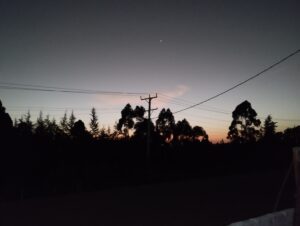
Going to Iten has been on the bucket list for many years. Like many other runners, I had often wondered how so many world class distance runners originate from such a small geographic area perched at the top of the Great Rift Valley in Western Kenya. When the opportunity presented itself I didn’t take too long to decide to go. It was a running training camp in Iten with a bunch of incredibly friendly runners from the UK, Ireland, USA and Hong Kong. My coach, Liz, had offered me a place and after sorting out the logistics with long haul flights, connecting domestic flights, and visas, I arrived and was ready to immerse myself in the experience.
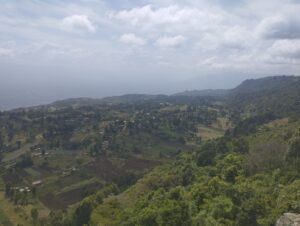
I wanted to head out to Kenya in decent shape. I figured the heat, altitude and hills were going to be tough enough without struggling with basic fitness as well. Some decent weeks of training leading up to the trip gave me confidence I could handle much of what the running would throw at me. More of that later.
There were two guided runs most days; a longer run in the morning of just over an hour and a shorter, slower run in the afternoon. Our Kenyan guides picked out some spectacular routes which invariably contained some proper hills and technical trail with a mixture of compacted earth, mud, rocks and gullies depending on what the weather had been like the night before. The hills in particular had you trying to catch your breath in the thin air (at 8000 feet elevation there is 25% less oxygen to breathe in) and a typical route profile is shown below.

The altitude elevated my overnight resting heart rate by between 5-10 beats per minute for the first few days until my body started to adapt.
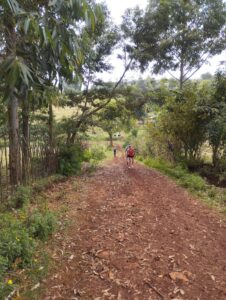
Morning runs were quite chilly due to the altitude but when the sun was beating down in the afternoon it was often a different story !
I was determined to learn as much as possible from the Kenyan runners I met out there. Some interesting observations were:
- Kenyans always run in groups in the mornings. Some will train individually in the afternoons but mornings are for groups. There is a real belief in the “magic” of the group dynamic.
- Kenyans don’t run bare foot. They wear exactly the same shoes as we do in the West. In fact many wear “super shoes” for all training as well as racing. They also wear Garmins but don’t obsess about analytics of training data like we tend to. I also didn’t see anyone listening to music at all out there whilst running.
- They don’t talk in terms of heart rate zones, cadence etc. You’re either running easy or running hard. It’s training, stripped back to its basics and this is something we can all learn something from.
- When Kenyans run hard, they REALLY run hard. After trying to keep up with some of their fastest runners in the famous “Kenyan Fartlek” session, I can definitely attest to this.
- When Kenyans run easy, they REALLY run easy. After being told to slow down when running at 8.30 per mile pace by a Kenyan runner who was a 2:10 marathon runner, it was a real lightbulb moment for me. I was totally bought into the concept of “Pole, pole” (pronounced “Polly, Polly” – which is Swahili for “Slowly, slowly”) by the end of the trip.
- For group runs, the lead runner controls the route and the pace. It’s considered bad form to overtake the lead runner and you have to watch their subtle hand signals to warn of hazards, vehicles, cows, potholes, rocks and everything else that could spoil your run !
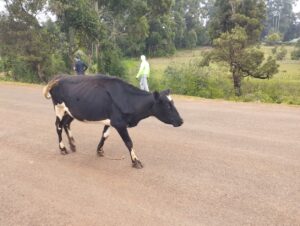
- When you meet a Kenyan runner, they ask your name first and then ask what your marathon time is. It’s a badge of honour they wear with pride.
- Kenyan children don’t learn to run by having to run to school. Although one of the continual delights of the running was having groups of kids running with you high-fiving you, they mostly got the bus to school. Having said that, most lived way off the main road so did a lot of walking. We saw lots of children constantly playing outside and having fun rather than sitting in a chair playing computer games for hours on end. The children we saw looked incredibly healthy.
- Running for many Kenyans is their route out of poverty. Most runners don’t have a job. They have thrown everything at their running in an attempt to get a sponsorship deal / contract and the opportunity to race abroad and earn money. The competition is so fierce. If you’re a 2:20 marathon runner out there, you have little chance of ever making it on the international stage.
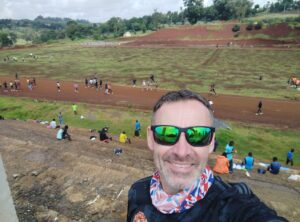
Some of the highlights of my trip were:
- Having an interval session on the famous Kipchoge track in Eldoret. On the day we turned up, the Kenyan anti-doping team had turned up and the locals weren’t allowed to train until they had filled in all the necessary paperwork. So, we had some of the finest runners in East Africa watching us running a 20 x 300m interval session which was quite intimidating !
- The Saturday long run traditionally takes place on the famous Moiben Road. This is an incredible place to run long on tarmac as the sun was rising with some “undulations” to keep things interesting. Getting overtaken by Emile Cairess and Marc Scott was a pleasure ! Some of our group saw a giraffe on the way back too. Sunday is a rest day. Most Kenyans are deeply religious and go to church on a Sunday so that’s a natural day off running.
- Attempting to join in the Kenyan Fartlek session was a fun and humbling experience. Two of us managed to keep up with a group of Kenyans for a few hundred metres and, from feeling pretty pleased with ourselves, we then realised they were on their “recovery” section and they instantly surged out of our reach as soon as their watches beeped !
- The Kenyan people are so warm hearted and lovely. Despite living in quite challenging conditions without much in the way of material possessions, they were generous with their time as well as their affection. Seeing the places where they live, where they train and the kit they have was a humbling experience.
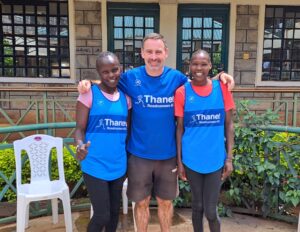
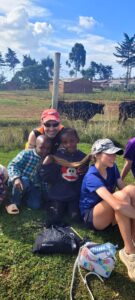
- Visiting St Patrick’s school where so many of the world’s best runners had trained was a great trip. David Rudisha went to school here and some of the school running records had to be seen to be believed !
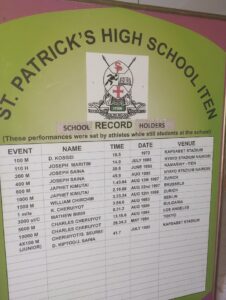
I could go on and on about the experience and what I’ve taken from it. It was totally captivating; a real culture shock and I met some wonderful people who I will remember for many years. Running double sessions most days added up to 70+ mile weeks with over 6000 ft of elevation. Some real leg building training.
Hopefully, if anyone has a trip to Iten, home of champions, on their bucket list like I did, maybe this will be give you a little encouragement to make it happen one day.
If anyone wants to hear any more, I’ll be happy to share more of the experience over a “Pole, pole” slow run sometime.
Andy.
